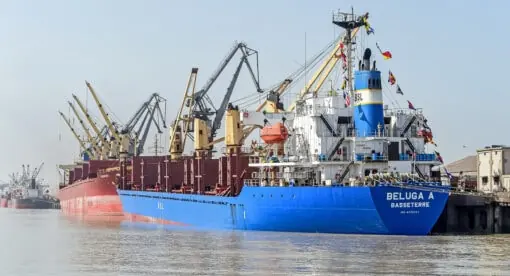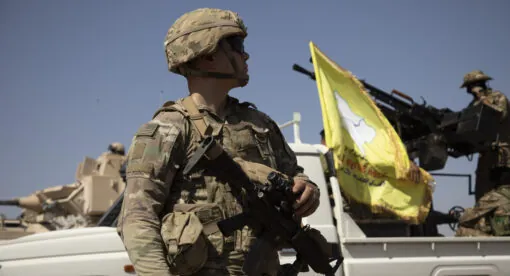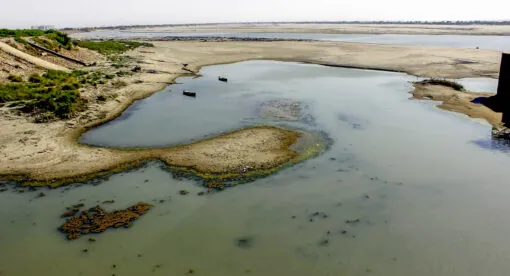In this episode of the Roamings and Reflections podcast series, guest host Nicholas A. Heras chats with Eugene Chausovsky about the underappreciated geopolitical dynamics that impact Taiwan, especially its energy supply chain security, its advanced semiconductor industry, and its effort to build a global network of commercial partners that can help it maneuver against China.
Nicholas A. Heras:
Hello everyone and thank you for joining us today for the New Lines Institute for Strategy and Policies’ Roaming and Reflections podcast series. I’m your guest host today, Nicholas Heras. And I will be talking to Eugene Chausovsky, our Senior Director for Analytical Development and Training, about his recent trip to Taiwan, where he learned a lot about the geopolitical dynamics related to Taiwan’s industry, its commercial strategy, its diplomacy, and its relationship with the United States. Okay, Eugene, so I’d like to ask, what are the big takeaways that you have?
Eugene Chausovsky:
Thanks very much, Nick. The big takeaways is that Taiwan is a vitally important place to the global economy, when it comes to the semiconductor industry in particular, that it’s obviously a geopolitical hot zone or a hotspot right now in terms of US and China tensions, and that really, with the war in Ukraine ongoing, this is an area that China, the US, and Russia, as well as other global players, are looking at very closely as potentially the next major development in global affairs. So it’s a really important place.
Nicholas A. Heras:
Thank you, Eugene. So one of the dynamics that I find so interesting about your work here at the New Lines Institute is that you spend a lot of time and energy looking at the geopolitical effects of the global energy trade. And you look at it from multiple different angles, oil, natural gas, and coal. Looked at it also at, what are the potential sources of energy that will impact, not only the geopolitical environment.
So I wanted to take it down from that august height to the situation now in Taiwan. How does energy security and global energy connectivity, which you’ve written a lot about, impact the current situation in Taiwan? And in particular, its industries such as the semiconductor industry?
Eugene Chausovsky:
Yeah, absolutely. I guess I’ll start off by mentioning that one of the main reasons that I was in Taipei was to attend a semiconductor conference, SEMICON 2023. And I participated in a very interesting panel on semiconductor sustainability, which is essentially the exploration of how semiconductors, energy, and climate change all intersect.
Now, this is tremendously important to Taiwan and tremendously important to the rest of the world. Taiwan is crucial when it comes to the global semiconductor industry. It produces about 60% of all semiconductors globally and 90% of the world’s most advanced chips. So, obviously, that’s important for everything that our modern life depends on, essentially.
Now, one, I believe, underappreciated, undercovered element of that semiconductor supply chain is energy. Taiwan is dependent on 98% of its energy supply from foreign suppliers. It’s an island, so it’s obviously somewhat vulnerable in terms of the maritime routes. And so, because of how much the world is advancing technologically and how much semiconductors play into that, Taiwan’s energy security or lack thereof is hugely important.
Now, Taiwan is trying to address some of those energy vulnerabilities. It is trying to basically diversify and go more towards renewable energy, but it has a long way to go. And in the meantime, it’s dependent on suppliers, which range from very friendly and aligned countries, like the US and Australia for coal and natural gas for example, but also from some non-aligned or potentially unfriendly countries, like Russia and then Qatar and Indonesia. So all of this goes to show how geopolitically charged the semiconductor situation is for Taiwan, and how energy really matters within that.
Nicholas A. Heras:
Thank you, Eugene. So it’s interesting, because Taiwan, as a non-state actor that has taken on so many of the features of a state actor, has really tried to break out of the diplomatic box that China’s putting around it, to be able to meet its imperatives, which, as you’ve outlined, are partly, very closely woven in, that it is so dependent on foreign sources of energy at this point in time. So what are some of the strategies that the Taiwanese are trying to take to alleviate this dependency when it comes to their engagement diplomatically, the global community, where China is putting tremendous pressure on them?
Eugene Chausovsky:
Yeah, so, obviously, for Taiwan, their relationship with the US is hugely important, not only because the US is a significant supplier of natural gas now, the global gas markets are very much influenced by LNG, or liquefied natural gas, of which the US is a significant supplier for Taiwan, but for Taiwan’s broader economic and security needs. So the US is a major consumer, a major customer of Taiwan’s semiconductors, and it’s also basically Taiwan’s security patron of sorts.
Now, this obviously gets into the complexities of the US-China relationship. There is still that kind of strategic ambiguity of sorts, where the US has diplomatic relations with China, and that obviously makes the relationship with Taiwan a little bit more sensitive. But essentially, the US is very important for all, as are other friendly countries like Australia, also an energy provider. But I think for Taiwan, it’s really those countries that are not pro-Western or not aligned. I mentioned earlier Qatar, Indonesia, even Russia are significant energy suppliers for both Taiwan but also for China, which is a much larger market.
So Taiwan has to be very cognizant of that in terms of potential manipulation of supply chain, potential manipulation by China of Taiwan’s energy supplies. So Taiwan has a concerted strategy to try to basically improve relations and really use its economic advancements, whether that’s in the chip industry, whether that’s in areas like AI, smart agriculture, things of that nature, in order to develop ties with countries in Southeast Asia and South Asia as well. So it’s really a multi-pronged effort on the part of Taipei.
Nicholas A. Heras:
So this multi-pronged effort, particularly looking at Southeast Asia, I’ve noted that in our discussions, you’ve talked about it almost as if it’s Taiwan’s southbound strategy. And India plays a significant role as perhaps the emerging actor in the world order today and well into the future. And as you know, India is a country the United States is spending particular attention to. In American strategic competition with China, how does India fit into Taiwan’s diplomatic strategy? And could you also explain to us how Taiwan’s southbound strategy, when it comes to its energy and its commerce, can potentially help it break out of any box that China places on it?
Eugene Chausovsky:
Yeah, it’s a very important question. Just on the southbound strategy, essentially it’s trying to build up ties beyond that kind of great power paradigm. I think it’s pretty clear where the likes of the US and China stand on the Taiwan issue, but countries in Southeast and South Asia are vitally important for the reasons that we mentioned earlier, not only for energy ties, but broader economic ties. So Taiwan is really focused on building up those relationships.
Now, India in particular was really a question mark, something that I really wanted to explore while I was in Taiwan, not only at the semiconductor conference, which had some Indian participation, but also in just meetings overall on everything from foreign policy to energy issues to the economy. So I think India is really a potential swing player, if you will. While it’s not an energy provider to Taiwan, India’s position in the event of a crisis in the Taiwan Strait, now whether that’s military or potentially a supply chain or economic crisis, India’s role would be very important. It’s obviously a major player on the Eurasian supercontinent, but it’s one whose alignment isn’t clearly in the pro-Western or anti-Western blocs, so to speak. And so, if there were to be a crisis of sorts around Taiwan, it’s not clear to me and it’s not clear to many Taiwanese, in fact, what role India would play.
Now I think an important parallel or an important example is the role that India has played in the Russia-Ukraine conflict. So while India has certainly not supported Russia’s invasion by any means, along the lines of countries like Iran or North Korea, it also hasn’t joined the isolation of Russia that the US and its partners in the EU have tried to spearhead. So that means that India has not passed sanctions against Russia since the invasion. And in fact, India’s economic and especially energy ties with Russia have only grown since the invasion. So that made me question, what would India do in the event of a Taiwan crisis?
Now, I will note that it’s a different context, right? India has a land border with China, one that’s come under some significant contention. India is, to some observers, a natural counterweight to China. But India also has significant economic ties with China. So this could be an important element to look at moving forward, one that I think is still unclear exactly what position India would take in the event of a crisis over Taiwan.
Nicholas A. Heras:
Thank you, Eugene. That’s very fascinating and it seems that you have developed quite an understanding of how Taiwan has to approach these non-aligned countries. And I expect that we will see more from you and others at the New Lines Institute on that subject matter, it’s very important.
I want to sort of pivot a bit to the Taiwanese-US relationship. As you and our listeners know, there’s been a lot of attention paid to the fact that the Taiwanese will be opening semiconductor foundries here in the United States in Arizona, and that’s getting a lot of attention. It also is starting to get a lot of attention here. So the US domestic discourse, both in terms of politics, but also in sort of tying it back to US efforts under the current administration, the Biden administration, to build back better and to sort of seize the commanding heights of future industry technology innovation, and all these things that require semiconductors. So what were some of your observations from your trip to Taiwan on the current state of the US-Taiwanese relationship, especially as it ties into supply chains, the semiconductor industry, and future energy sources, green energy and other technologies?
Eugene Chausovsky:
Yeah, another very important question. So I think that the US-Taiwan relationship is very robust, and that was confirmed to me in all of the meetings that I had, the importance of the US in all facets of Taiwan’s overall geopolitical situation. Now, Taiwan is obviously aware of and supportive, to a large degree, of US and even EU efforts to basically strengthen their own supply chain, and that means building some of their own semiconductor production capabilities.
Now, the US plays a leading role in the design of semiconductors, but the production, as you mentioned, building a plant in Arizona, I know there’s also plants in Germany as well, but these are done in coordination with Taiwan and really with TSMC, which is Taiwan’s leading semiconductor manufacturing company. This is all kind done in coordination, but certainly Taiwan has some concerns that those efforts could potentially, down the line, take away or undermine its “silicon shield,” that has been essentially protecting Taiwan from Chinese intervention, at least up until now.
Now, I think one thing that I think is important to note here, and this was really hammered home at the semiconductor conference that I attended, was that the semiconductor industry is one that requires a whole ecosystem in order to flourish. And that includes everything from talent to huge amounts of funding, the latest cutting edge technology, labor, and then supply chain partners. And Taiwan has basically, over the past decades, positioned itself to take on that most advanced and cutting edge role. And that’s not something that is easily replicated.
I know China is certainly trying to do that, and we’ve seen a lot of challenges. Even the US and some of its allies in Europe are trying to do that also for their own motivations. And we’re seeing challenges with that, albeit of a different nature. So that’s all to say that this is a very complex issue, and the semiconductor supply chain is very globally interwoven and very difficult for countries to basically block off completely one partner or another from the supply chain. So because of the geopolitical nature and how it ties into everything from energy and security, this is, I think, one of the most important questions and one of the most important issues to track in the international system moving forward.
Nicholas A. Heras:
Eugene, it’s very interesting because one of the other elements that I found quite interesting and provocative from your thoughts on your trip was that there’s an election cycle happening in Taiwan, and one of the most powerful political parties in Taiwan, the Kuomintang, KMT, is sort of approaching a close to the US but not so close that it becomes a tool of US strategic competition with China.
And in our conversations, and I found it very interesting, the nuances you were able to develop in your interviews with Taiwanese interlocutors on how Taiwan’s own domestic political considerations play into its strategy vis-a-vis China and vis-a-vis the United States. So I wanted to ask you, what is your view on how the Taiwanese are trying to manage this delicate diplomatic dance of being very close to the United States but not so close that they bring China over the strait?
Eugene Chausovsky:
So you mentioned, Nick, that I happened to be in Taiwan when the election season is gearing up. They have presidential elections coming in January of next year. And then, of course, we have the presidential elections in the US later next year as well, so it’s a very important time now, politically speaking.
There are differences and there are elements that play into that. So for example, we talked about energy before. And the current ruling party, the DPP, has currently plans to phase out nuclear power, which is a bit controversial. I think even some of the DPP officials would acknowledge that, given the energy security issues that we’ve talked about. Now, they have sort of moderated that stance and said that this is something to be looked at more closely as Taiwan prepares for its own climate action plan, as it prepares to gear up its own energy security in order to meet the growing energy demand to fuel that semiconductor sector.
Now, overall, from my conversations throughout my trip, both in the conference and outside of it, I think there’s a very nuanced understanding, from all elements of the people that I talk to, about that line of not pushing China too far, so to speak. And so, I describe it basically as a spectrum. On the one end you have independence, which clearly would be something that would trigger some kind of Chinese action if Taiwan were to go that route. On the far end of that spectrum, you have integration or China absorbing Taiwan.
Now, most people are very aware of those two different things and trying to keep things relatively in between those two poles, right? So trying to avoid the most provocative or seemingly provocative measures that they believe would cause China to react in a very aggressive way, while also maintaining the very important economic and security ties with the US. So this is something that I think has a great deal of nuance to it, but something that everybody in Taiwan, I think, is mindful of and well aware of.
Nicholas A. Heras:
It’s interesting, Eugene, because one of the platforms of the current ruling party really does emphasize something we see here in the United States. And we have the six core strategic industries, which are information and digital industries, cybersecurity, precision health, national defense and strategic industries, green energy and renewable energy, and industries to help people’s livelihoods and their preparation in their lives. And it seems that so much of the nuance in Taiwan’s approach that you’ve outlined really does come down to the fact that it’s probably impossible for Taiwan to completely avoid, at some future date, just the sheer gravitational pull of China.
And one of the dynamics that I find fascinating about your reflections from your trip, that we’ve talked together about, that I think would be great to share with our audience is sort of, okay, if you’re going to game this out and forecast this out, if Taiwan gets in a place sometime in this decade where it is improved its energy vulnerability, it has succeeded in developing multiple partnerships in the United States and in Europe, for the semiconductor industry, but it still maintains its pole position as the place for the manufacture of the most advanced semiconductors and improved some of the dynamics related to its geopolitical position, especially its diplomacy with non-aligned countries, as well as its military preparedness, in your mind, what is the best that Taiwan can hope for when it comes to China, when it comes to the United States? What do you view as the best position it could achieve by, say, 2030?
Eugene Chausovsky:
Well, I think I would say that what Taiwan is hoping for, and it has largely achieved up until now, is basically operating as a sort of technocratic place, in line with your Singapores and other advanced economies in the Asia Pacific Theater, but without all of the geopolitical intrigue that strategic location and its complicated history entails.
Now, I think something that most, if not everybody, acknowledged, that Taiwan, for all of its political tensions with China, has significant economic linkages there. China is a major source of trade, of investments. China’s own economic rise has been highly beneficial to Taiwan and vice versa. And I think that ideally, from the Taiwanese perspective, that it can maintain and expand its trade ties and its economic ties with China, with the US, and everybody in between.
Now, we also know that there are a lot of political sensitivities and geopolitical issues that could potentially undermine that, and we’re seeing some signs of that already, with things that we’ve talked about in terms of the competition between the US and China over technology, which Taiwan is very much a part of, in terms of the maneuvers that China has done around the island of Taiwan, especially when there’s politically sensitive visits from the US to Taiwan and vice versa. So basically to try to mitigate as much of that intrigue, if you will, or the geopolitical rumblings, and really maximize just the technical economic elements that have raised the standards of living of Taiwan and really a lot of the other countries in the region would be the, I think, the ideal situation for any government in Taipei moving forward.
Nicholas A. Heras:
Thank you very much, Eugene. Well, I want to wrap up our conversation by giving you the opportunity to imagine if you were brought into National Security Council and you were asked by Kurt Campbell or another high-ranking official, even National Security Advisor Jake Sullivan, “Okay. What is the most important thing we can do as United States to support Taiwan in its objectives to reach this positive future that you’ve forecasted,” what would it be?
Eugene Chausovsky:
Yeah, I think that would entail continuing the type of support that the US has long provided Taiwan in terms of the security support, economic ties, trade ties, things of that nature, integrating its semiconductor industry and other industries into this globalized supply chain. But also to be prepared for potential pitfalls, if you will. I think energy security is really one of the most important things for Taiwan, as we’ve already discussed. Not only in terms of potential Chinese manipulation, which I think the US and Taiwan and their allies should be prepared for, but even just the growing consumption and the trends of electricity generation that’s fueled by semiconductor production and its technological evolution. These are things that Taiwan needs to be prepared for. I think there’s no one solution to that, but having a diversified supply, as friendly countries as possible, as well as making plans for that renewable energy transition in a responsible yet assertive manner, I think would be the next thing.
And really, I think the non-aligned countries that we discussed are going to be important not only for Taiwan, but for the US. We’ve seen the importance of these countries when it comes to US strategic interests on Ukraine, for example, and its fight with Russia and how those nine aligned countries, while not directly benefiting Russia, have added to its resilience. I think that would be even more the case for a country like China, which has, through its Belt and Road Initiative and other measures, has built up economic and diplomatic ties around the world.
So I guess what I’m saying is that the US needs to help Taiwan prepare more for the future and see Taiwan in the broader global picture, because the world is very much interconnected. We’ve seen that, basically how the Ukraine conflict intersects with Taiwan, which intersects in turn with other elements of the Eurasia, like India, like Southeast Asia. So these are all things that I think that the US should, along with its partners in Taiwan, think about strategically, and plan accordingly.
Nicholas A. Heras:
Thank you very much, Eugene, for sharing with us your incredible insights from your time in the field in Taiwan. And we, here at the New Lines Institute, will continue to view Taiwan, as you put it so aptly, in the broader global picture of geopolitical dynamics that affect us all. Thank you, for those who have joined us, and we continue to look forward to provide you with sharp insight into the affairs that affect everyone here on planet Earth.






